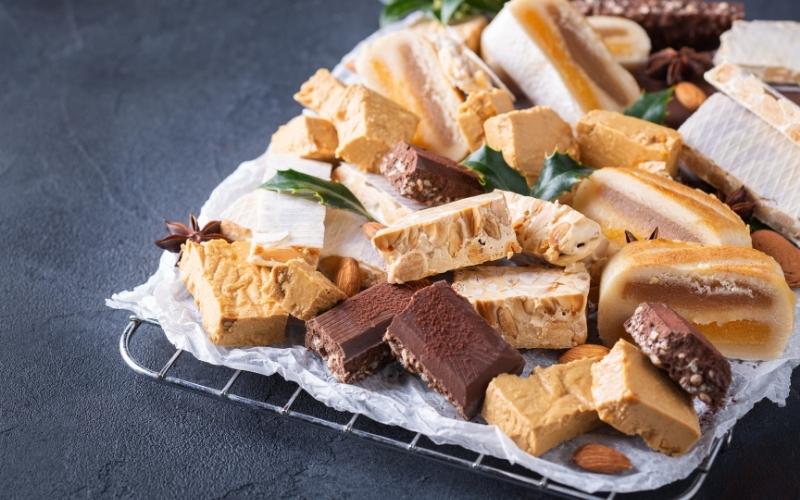Turron is one of the most rapidly rising stars of the international gourmet scene. These traditional Spanish sweets are enticing more and more people with each passing year. So it’s unsurprising that some of the turron-producing brands are becoming household names here in the US.
In this article, we’ll be breaking down two of the more famous ones: Turrones El Artesano and Turron 1880.
 What is Turrones El Artesano?
What is Turrones El Artesano?
While relatively young for a big-name brand, El Artesano has managed to carve out a large following, strong brand recognition, and trustworthy reputation, comparable to brands that have made turron - traditional Spanish nougat confectionery - twice and thrice the time El Artesano has been on the market.
That is not to say that El Artesano is a new brand, not at all. It was established in 1969, so it spans a solid half a century on the market, so its quality and reputation have been tested by time (and multiple other, smaller brands that have vied for the place on the market as the fame of the aforementioned Spanish sweets grew).
Initially named Turrones El Artesano (spn. for “artisanal turrons”), the company was then expanded and rebranded as Mira y Llorens SA and now includes seven subsidiaries, including the original. All seven subsidiaries specialize mainly in one product - gourmet-quality traditional turron (though that is not the only weapon in their well-stocked arsenal).
What makes El Artesano turron particularly deserving of interest (and, arguably, support) is that it’s one of the few completely women-owned companies in the competitive business of turron manufacturing. If a company like this sprang up right now and went from a local start-up to an internationally recognized brand, it would still be a big deal, even if female entrepreneurs are becoming more and more common.
Back in 1969, it was hard to imagine that a small start-up run by three sisters would one day become as big as it is now.
Carmen, Pilar, and Maria Filiol had a vision and determination and had recipes for impressive traditional nougat confectionery. With a bit of financial investment, the sky seemed the limit. The money came from their father, Vicente Filiol, a successful carpentry owner, who might’ve not understood how his daughters were planning to make big with sweets, but he was interested in letting them try their hand at it, anyway.
The sisters didn’t delay much after getting their finances straight: they inaugurated the first industrial warehouse located right there in their father’s carpentry, on the ground floor, that he agreed to turn over to their turron-making ambitions.
From the very start, Maria was the one who ran the daily affairs of the company, and thus the one that should be rightfully lauded for El Artesano becoming what it is today: a turron megacorporation that exports traditional Spanish sweets to over 25 countries and is often a foreigner’s first venture into the world of Spanish nougat.
 What is Turron 1880?
What is Turron 1880?
If El Artesano is a story about how perseverance and business acumen can create a global sensation in less than half a century, Turron 1880 is a story about how consistent quality and dedication to preserving traditions can help a company last for three centuries. As it stands, Turron 1880 is likely the oldest Spanish nougat manufacturer with a continuous presence on the market.
Bautista Sirvent, the Alicante-based confectioner, established the company in 1725. Since then, it has transferred from one generation of the Sirvent family to another. To this day, the company is still run by the family.
Unsurprisingly, the company wasn’t always named 1880. What Bautista Sirvent called his initial creation remains a mystery, as the company’s official website doesn’t disclose the information. The current name, Turron 1880, was chosen for a very specific reason: it was the year when the company’s secret premium-grade turron recipe was recorded and presented as a delicatessen product.
Before the recipe was written down, it was transferred from one maker to another orally and only disclosed to family members and closest friends. The only thing anyone knew about Sirvent family turrons was that the sweets were made with exceptionally high-grade raw materials like almonds and honey.
This pickiness with raw materials made it hard to create and distribute the turrons during the post-War era when even low-quality almonds and honey were considered to be luxury products, not to mention the high-grade stuff the Sirvent family was using to make their miraculous turrons.
Their unwillingness to compromise when it came to the quality of their raw materials drove the cost of both the production and final price point up significantly. Instead of looking at how to cut corners and increase their sales, the family decided to double down and play up the exclusive reputation 1880 turron was getting.
“El Turrón más Caro del Mundo” became the company motto, “the most expensive turron in the world.” While the post-War era is long gone, and the premium ingredients Sirvent family was so determined not to give up on keeping their iconic turron as it was are not nearly as complicated or expensive to obtain as they were back then, the motto stuck.
Sirvent family turron might not be as exclusive and decadent a product as it was decades ago, but its air and reputation still remain: Turron 1880 is for true connoisseurs, the ones who understand that the premium ingredients are what make premium turron (and premium quality cannot come if the manufacturer decides to cut corners).
 Which Brand Has More Options?
Which Brand Has More Options?
In this case, the variety seems to be more or less the same with both brands. Traditional Spanish turron is not a product that cannot be boldly experimented with, but the foundations are pretty rigid, and as both companies have aspirations to be seen as the premier turron producers, they keep their assortments sufficiently varied but not so much to overshadow the most famous turron varieties: turron de Alicante (the hard and brittle white turron with whole almonds) and turron de Jijona (soft and crumbly golden turron made with almond paste).
Other than the two most famous varieties that come in several shapes from both companies (traditional bar, round “cake,” and small “bites”), both selections include less famous but still popular turron de Yema Tostada (roasted egg yolk nougat), some varieties of chocolate turron, and fruit turron (turron bar with candied fruits).
Both El Artisano and Turron 1880 offer gluten-free turron options, but interestingly only El Artisano has a line for vegan turron (the recipe uses rice syrup as a sweetener instead of honey).
All in all, flavor options vary more in the Turron 1880 selection (though primarily due to the wide range of chocolate turron assortment), while the El Artesano variety is determined mainly due to different packages and the addition of gluten-free and vegan lines.
Where the true diversity comes in are other, non-turron lines. Both companies have long amended their manufacturing to include non-turron Spanish sweets. Both Turron 1880 and El Artisano have an attention-grabbing assortment of chocolates, as well as more unique options like soft vegan fruit cakes (El Artesano) and tiny pastries and crumble cakes (Turron 1880).
Which Brand Offers More Unique Flavors?
Once again, both companies primarily stick to the tried and tested classic flavors, but El Artisano does bring a little more originality into its flavor catalog (though it doesn’t take outlandish risks that may drive away a loyal customer base that comes to its products for reliable classic flavors).
Some noteworthy options include pistachio marzipan turron, orange marzipan turron, chocolate turron with whiskey, and rum raisin turron. Catalan cream turron is another exciting addition to the line-up - it’s somewhat similar to turron Yema Tostada but with a more pronounced, sweeter, and creamier flavor.
Turron 1880, in comparison, largely varies its assortment via various chocolate turrons (the variety ranges between milk, dark, and 70% dark chocolate options). The more unique flavors include cinnamon-flavored soft turron and turron Yema Tostada with cherries.
 Which Brand is Better Overall?
Which Brand is Better Overall?
As usual, it’s hard to say that one is 100% better than the other, considering there are many caveats to evaluating the product they produce.
- The Packaging
In this case, we’d say both brands are about the same. While both Turron 1880 and El Artisano products come in sturdy cardboard packaging, neither goes much more elaborate than that. The packaging isn’t designed to be decorative but practical. In the end, in both cases, it’s just a box in which the true king - turron - comes, no more and no less.
That is not to say that the packaging is visually daunting. In both cases, it’s slick and elegant, with a dark background, enticing, colorful imagery of the product, and attention-grabbing golden letters boldly marking the brand name in large script.
It is visually appealing, but no more. And certainly not the primary determinant when deciding which brand is better.
- The History
In this case, Turron 1880 definitely has El Artesano beat. It has most other turron manufacturing companies beat. It’s hard to compete with a company that spans almost three hundred years and boasts a recipe that was written down nearly a century and a half ago.
On the other hand, if you’re someone who has a special place in their heart for social causes and likes supporting female-owned businesses, then El Artesano’s history might be more important to you, even if it is significantly shorter.
- The Flavors
Once again, the two brands are mostly evenly matched, though El Artesano does edge out Turron 1880 a bit when it comes to the variety in their assortment. The pistachio marzipan turron is a particularly interesting option, with chocolate turron with whiskey and rum raisin turron being the others on the El Artisano “must try” list.
On the other hand, when it comes to the classic turron de Alicante and turron de Jijona, it’s Turron 1880 that has a slight edge. The long-lived secret family recipe and the Sirvent family’s insistence on working with only particular products that meet their tight criteria for making exclusive delicatessen products do have the flavors in these classics shine just a tad brighter.
- The Decorative Aspect
We’d have to say that this one is a tie. While, as we already mentioned, the packaging for both Turron 1880 and El Artisano is visually appealing, slick, and somewhat elegant, neither is particularly elaborately decorated. The most noticeable decorative aspect is brash golden lettering on a dark background, and it’s a characteristic that both packaging styles share.
- The Price
El Artesano is undoubtedly the more affordable one of the two. An 8.8 oz package of turron de Alicante from El Artesano costs around $9, while an 8.8 oz of turron de Alicante from 1880 goes somewhere between $16-$20.
A 7 oz package of turron Yema Tostada from El Artisano costs around $6, while more unique flavors in comparable packaging cost between $6-7. Comparatively, an 8.8 oz of 1880’s turron Yema Tostada costs around $16.
El Artesano does have a premium product line with higher prices, but even in this segment, 1880 is more expensive: a 7.8 oz of El Artisano’s premium turron de Jijona costs around $16, while Turron 1880’s 8.8 oz costs $22.
Which Turron Option Is the Best for a Newbie to Start With?
For those, who are only now familiarizing themselves with Spanish turron, El Artisano might be the better choice, as the brand offers a more affordable selection and a few unique flavors to explore.
But for those who are already familiar with Spanish turron, it might be worth it to spend a few extra bucks and try Turron 1880’s premium-grade sweets for a more luxurious, gourmet experience.


 Check out Yummy Bazaar’s Gourmet Turron Assortment for More Options from Iconic Brands!
Check out Yummy Bazaar’s Gourmet Turron Assortment for More Options from Iconic Brands!